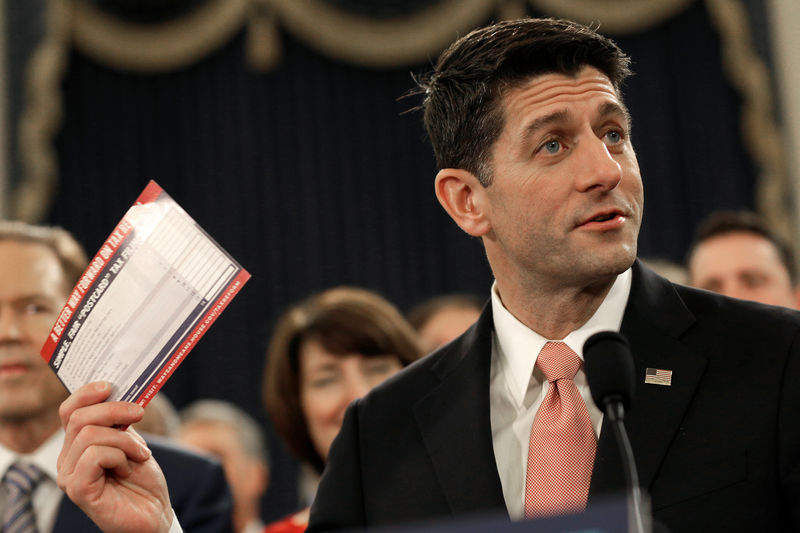By Amanda Becker
WASHINGTON (Reuters) - U.S. House of Representatives Speaker Paul Ryan said on Sunday that Republican lawmakers are weighing a "host of ideas" as the House tax-writing committee begins revising a tax bill this week, though he expects the broad outlines to remain the same.
Ryan, a Republican, told Fox News Sunday that House tax writers are considering President Donald Trump's call to include in the tax package a repeal of an Affordable Care Act provision that mandates individuals buy insurance coverage.
"We have an active conversation with our members and a whole host of ideas on things to add to this bill. And that's one of the things that's being discussed," Ryan said.
The tax-writing House Ways and Means Committee will on Monday begin considering revisions to the tax bill released last week, which would constitute the biggest overhaul of the U.S. tax system since the 1980s.
Ryan said he believes the House is still on track to vote on a revised tax bill before the U.S. Thanksgiving holiday on Nov. 23.
The Senate is developing its own version of the legislation, but Ryan said he expected it to be similar enough that the two chambers could resolve their differences and pass a tax bill before year's end.
"We had basically decided the big ticket items: the big 20 percent corporate rate – a 25 percent rate for pass-through businesses, the middle class tax cut," Ryan said.
"All of those things are things we agree on, and so these bills are written within those details. So that's why those differences will be fairly narrow," he added.
If it passes, the tax overhaul will be the first major legislative achievement since Republicans took control of the White House and Congress in January - and a rebound from their failure to overturn the Affordable Care Act, or Obamacare.
RESISTANCE FROM SOME REPUBLICANS
One sticking point among Republican lawmakers is the proposed repeal of a popular federal tax deduction for state and local tax (SALT) payments. The repeal would disproportionately hit taxpayers in states such as New Jersey, New York and California, which send enough Republican lawmakers to Congress to derail tax legislation.
House Ways and Means Chairman Kevin Brady worked out a compromise last week that would preserve the deduction for property taxes, but not state and local income taxes. The property-tax deduction would be capped at $10,000, but Brady has already said he would be open to raising that cap.
"It's wrong and it would have an extremely damaging effect on my constituents," Republican Representative Peter King of New York said on ABC's This Week of the proposed state and local tax deduction repeal.
King said that Trump voters from his district in the suburbs of Long Island, near New York City, have contacted him to object to the proposal. His vote, he said, is a no "as of now."
Representative Mark Meadows, the head of a conservative Republican faction in the House, indicated that he will support the tax package, even though estimates show it could add $1.5 trillion to the federal deficit over the next decade.
"We believe that the economic growth will outweigh any short-term deficit increase that we see," Meadows told ABC's This Week.
The House tax bill's impact on the federal deficit, and its underlying assumptions about economic growth, have already prompted several Republican senators to say they could not support it.
Republicans hold 52 seats in the 100-seat Senate and can only afford to lose two votes to pass tax legislation with Vice President Mike Pence as a tie-breaker.

"I am a no," Republican Senator James Lankford told "Meet the Press" on Sunday. "I want to be sure we have reasonable assumptions in the process for growth estimates."